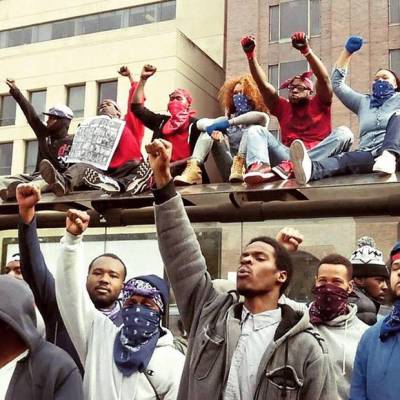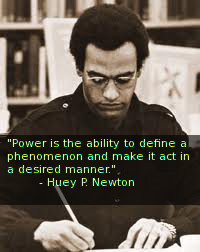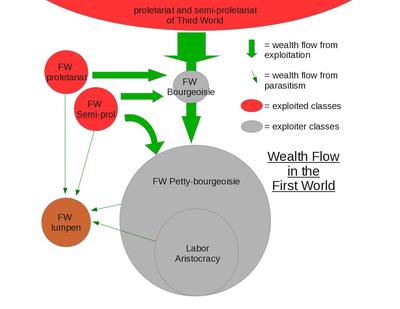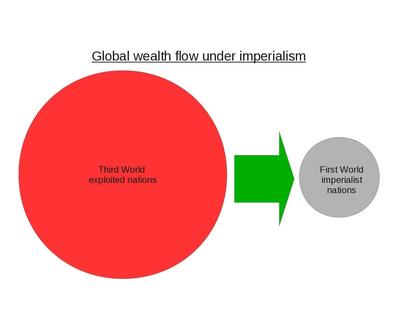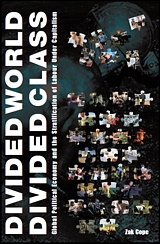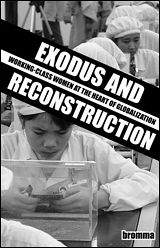
Book Review: Marxism, Orientalism, Cosmopolitanism (part 2 of 2)

Book Review: Marxism, Orientalism, Cosmopolitanism
Gilbert Achcar
Haymarket Books 2013
In part one of this review i addressed the author’s apparent disdain for the anti-imperialist Islamic movement. In this concluding article i will expose the author’s First World chauvinism as being at the root of his reactionary perspective by explaining how he uses the Christian liberation vs. Islamic fundamentalist concept in religion and politics today from a Marxian perspective, so as to better prepare the reader for his ideas on “internationalism” and “ultra-nationalism” by which he really means revolutionary nationalism. As such, it would seem that the entire premise of this book was not intended as a supplemental analysis of anti-imperialist politics in the Middle East today, but so that the author can push his crypto-Trotskyist agenda. Crypto-Trotskyism is a term used to refer to organizations that exhibit Trotskyist tendencies, but which don’t admit to being Trotskyist. Most significantly they suffer from the same great nation chauvinism as the other Trots: over-emphasizing the role of the oppressor nation working classes, and under-emphasizing the role of liberation struggles of the oppressed nations.(1)
The author begins the final essay of this book titled “Marxism and Cosmopolitanism” by tracing the very hystory of the word cosmopolitanism. He discusses how it went thru many twists and turns, from its beginning in ancient Greek civilization thru the Middle Ages and up until today; at one point progressive, while regressive at another. Hence, we learn that the terms cosmopolitan and globalization are connected in this regard. We also learn that Marx and Engels shared Achcar’s disdain at one point or another for any and all national movements, in particular for those centered in the capitalist periphery, preferring, instead to champion the cause of the global proletariat, which in their lifetimes meant focusing on European workers. As a result, Marx and Engels contributed to popularizing the concept of cosmopolitanism as interchangeable with international proletariat, which to many communists of the time was preferable to mentioning by name the plight of English or German workers because of the obvious connotations to nationalism. Such connotations were seen by most as giving legitimacy to nationalist struggles, which at the time were driven by the national bourgeoisie.
Within this context nationalism was viewed as backward and reactionary for the proletariat, as the national bourgeoisie was using this concept to their advantage by inciting the proletariat to kill and be killed by workers of other countries, for the bourgeoisie’s goal of world domination. The communists on the other hand rejected nationalism, considering themselves staunch internationalists; champions of the world proletariat, whose hystoric mission it was to usher in the socialist stage of communist development. This being the accepted theory of the time, well before Mao posited that in the age of imperialism, nationalism of the oppressed nations is internationalism.
All this is important to remember when assessing the text as it pertains to the whole reason why Achcar even wrote this book. More so, it is important to remember because in the following pages the author uses much of this information to attack the practice and political line of Joseph Stalin. And while it is undeniable that Marx and Engels at one point agreed with many of the ideas that Achcar propagates, it is also undeniable that as reality progressed, so did Marx and Engels’ thinking, which is more than we can say for Mr. Achcar. So if we want to learn the genuine Marxist stance on nations and nationalism then we should not limit ourselves to what the founders of scientific socialism had to say on these topics early on in their revolutionary careers. Rather, we should study and learn what they advocated and stood for later in their lives once they became full-fledged Marxists. As such, the line that Achcar is pushing is a disingenuous one in which he proclaims that all nationalism, just like all variants of revolutionary Islam, are inherently bad, when in reality it is the nationalism of the oppressor nations and the Western privilege that comes with it that he upholds. As such, Gilbert Achcar should just come out and say what he really thinks; which is that the nationalism of the oppressed is what he believes to be backward and reactionary, while oppressor nation nationalism is inherently progressive due to its linkage to Europeans, their culture and tradition. Thus, just as the author correctly pointed out in “Religion and Politics today from a Marxian Perspective,” that Islamic fundamentalism is a concept that can be divided into one that is collaborationist with Western interests and one that is hostile to Western interests, so is nationalism a concept that can be divided into one that is bourgeois and reactionary, and one that is revolutionary and forward looking.
“Cosmopolitanism” as Anathema: the Stalinist Perversion
Trotskyists of various stripes have always hated on Stalin for a multiplicity of reasons, primarily however for his theory of socialist development. As Stalin’s line on socialist development progressed it eventually came to stand for the national liberation struggles of the oppressed nations, not only within Europe but outside the continent as well. He correctly saw the revolutionary character of the anti-imperialist movement in the colonies as both hostile to Western interests and potentially pro-Soviet. Trotsky on the other hand had nothing but contempt for Asians, Africans and Latin@ Americans, believing them too backward and weak to ever launch successful liberation struggles and/or engage in socialist construction absent the immediate help of the European working classes, a theory that was proven incorrect when an onslaught of colonial countries broke free of the imperialist framework following the end of World War II. And so it is within the context of “globalization” and anti-imperialist struggles in the 21st century that Gilbert Achcar now attempts to rehabilitate Trotsky’s theory of the world revolution led by the so-called proletariat of the advanced capitalist countries vis-a-vis the rehabilitation of cosmopolitanism; vis-a-vis his criticisms of Joseph Stalin. To accomplish this however, Achcar must go in depth into the hystory of the Soviet Union, in particular into the propaganda campaigns against cosmopolitanism which Stalin had initiated at the end of World War II, as well as to the campaigns in favor of Soviet patriotism which Stalin also had initiated to prepare the Soviet masses for the Nazi invasion.
According to Mr. Achcar these campaigns were nothing more than a cover for Stalin’s anti-Semitism. Yet interestingly enough, in making these accusations the author inadvertently puts forth a plausible explanation for the oppression of notable Jews during this period in the Soviet Union; thereby paving the way for a materialist explanation of these actions and the clearing of Stalin’s name as far as anti-Semitism goes.
Achcar like so many anti-communists before him cannot contain his contempt for the progress made under Stalin and so he jumps on the bourgeois bandwagon of blaming Stalin for the so-called Jewish pogroms that were said to have taken place beginning in 1949 alongside the further elaboration and popularization of Soviet patriotism as a concept over that of cosmopolitanism. In addition, the author also contends that these campaigns were one and the same as the so-called anti-Marxist movement which supposedly took place during this period. What these campaigns actually represented however were struggles in the realm of ideas between revolutionaries and counter-revolutionaries battling for the “hearts and minds” of the Soviet masses, and indeed the future of the revolution.
According to Achcar, the cosmopolitans appear to have been something like a Trotskyist sect operating inside the USSR, who were agitating around the need for openness with the West and glorifying the West. Now remember, this is 1949 and the Cold War is cracking, all of the Soviet Union’s wartime imperialist allies have retrained their guns on the communists. And although the author certainly doesn’t say it, the Communist Party under Stalin certainly believed that these “cosmopolitans” were in the service of Amerikan imperialism carrying out intelligence gathering activities and engaging in building public opinion for counter-revolution and coup d’etat, just like the types of activities that CIA sponsored groups carry out in Third World countries with anti-western governments. It would seem then these cosmopolitans and other so-called “Marxists” were actually involved in sabotaging socialism from within with actions which thoroughly alarmed the Soviet government. But according to Achcar these were the real “Marxists,” the real “internationalists” because they followed the teachings of the young Marx; but when did Marx ever speak of colluding against a socialist state?
Furthermore, the author states that in analyzing Stalin’s anti-Semitism we cannot afford to begin in the post-war period, but must start with the publication of Marxism and the National Question, which Achcar describes as “a superficial and dogmatic essay on this most complex of questions.”(2) Stalin denies the existence of a Jewish nation within Europe’s borders, based on the Jewish people’s lack of a common territory. Apparently Gilbert Achcar disagrees with the Marxist definition of nations preferring instead Otto Bauer’s The Question of Nationalities and Social Democracy, which clearly defines Jews as a nation based solely on their “common cultures” by which they should really just say religion. The author further claims that it is in this hystorical period that Stalin began his first anti-Marxist campaigns in which he sought to squelch all opposition and secure his position of power. Achcar goes on to argue that Stalin’s ideas on internationalism reflected only a narrow and selfish outlook which took into account only the internationalism of the “pan-Tsarist” Russia organization of the Russian Social Democratic Labour Party when, in Marxism and the National Question, he mentioned the principle that the party strove to “unite locally the workers of all nationalities of Russia into single, integral collective bodies, to unite their collective bodies into a single party.”(3) In defending this principle Achcar states, “Stalin launched a fierce attack on nationalism, putting Great Russian chauvinism on equal footing with the nationalism that was expanding among oppressed nationalities in the USSR - in a definitely non-Leninist fashion.”(2) However, this is an extreme misrepresentation of Stalin’s line on Achcar’s part. Stalin criticized the national chauvinism that was beginning to develop among some of the more reactionary sectors of the oppressed nations in the Tsarist empire and certainly not the nationalism of the oppressed themselves. Apparently, the author believes that national chauvinism should only be criticized when it originates with the oppressors and by people of the offending nation themselves and not by anyone else. In other words, only Russians can criticize Great Russian chauvinism and only the oppressed nations can criticize any chauvinism that originates within their own nations. This is certainly an ironic point that those who have actually read Marxism and the National Question will note. But Stalin was right to criticize the chauvinism of the oppressed nations in the old Russian empire, especially when that chauvinism has the potential to foment violence amongst the oppressed. Chauvinism is chauvinism no matter who propagates it.
Later on Mr. Achcar comes out with an ass-backwards refutation of Stalin’s theory of socialism in one country first, attempting to tie it back to Stalin’s “anti-Semitism” (Achcar’s term for his denial of a Jewish nation) and Soviet patriotism. The line goes as follows: “Socialism in one country: this theoretical innovation central to Stalinism actually laid the groundwork for a Soviet patriotism, coupled with a sui generis internationalism that amounted in fact to the internationalism of Soviet patriotism. Communist members of ‘bourgeois nations’ had a duty to identify with the thriving ‘fatherland of socialism.’ Indeed, their Soviet patriotic duty could very well have taken as its motto ‘our country, right or wrong!’”(4)
The following paragraphs is where accusations of Jewish repression and anti-Marxism by Stalin really gets interesting.
To give some real context to these accusations, which Achcar himself provides, I will say that prior to the beginning of the Second World War an expansive campaign was begun in the Soviet Union to create and solidify a hegemonic Soviet patriotism for the explicit purpose of strengthening the bonds and common interests of the Soviet Republics against the impending threat of fascism. Stalin was well aware that not only the German fascists, but the soon to be imperialist allies were all working hard to divide the Soviet people from within on the basis of old national grievances which were common under the Tsar. And, as stated earlier, there were counter-revolutionaries inside the USSR consciously working against the Soviet masses. These were the cosmopolitans who by and large were composed of “real Marxists.” The struggle between the two opposing forces is recounted and explained by Achcar:
We agree with the decision to disband the Comintern, which was done because“The patriotic mutation was brought to completion after the Soviet Union entered the Second World War, engaging in what the Stalinist regime called the ‘Great Patriotic War.’ This went along with the rehabilitation of the Greek Orthodox Church and the resurrection of Slavophilism.”Soviet Patriotism” became a highly praised virtue in the Soviet Union and in the world communist movement while Stalin’s brand of ‘internationalism’ reached its logical conclusion in the 1943 dissolution of the Comintern.
“Soviet patriotism mutated into full-fledged chauvinism after Moscow emerged victorious from the war, especially when the Soviet Union faced renewed ostracism with the start of the Cold War. It is against this historical background that the campaign against ‘cosmopolitanism’ unfolded.”(5)
“it became increasingly clear that, to the extent that the internal as well as the international situation of individual countries became more complicated, the solution of the problems of the labor movement of each individual country through the medium of some international centre would meet with insuperable obstacles.”(6)
Leszek Kolakowski is then cited favorably by Achcar as giving the Trotskyist perspective of these events:
“In 1949 the Soviet press launched a campaign against ‘cosmopolitanism’, a vice that was not defined but evidently entailed being anti-patriotic and glorifying the West. As the campaign developed, it was intimated more and more clearly that a cosmopolitan was much the same thing as a Jew. When individuals were pilloried and had previously borne Jewish sounding names, these were generally mentioned. ‘Soviet patriotism’ was indistinguishable from Russian chauvinism and became an official mania. Propaganda declared incessantly that all important technical inventions and discoveries had been made by Russians, and to mention foreigners in this context was to be guilty of cosmopolitanism and kowtowing to the West.”(5)
Achcar then describes how, according to Isaac Deutscher, Stalin ordered a crackdown on Jews in the Soviet Union following “massive demonstrations of sympathy by Russian Jews who in 1948-49 greeted Golda Meir the first ambassador to Moscow of the newborn state of Israel…”(7)
According to Deutscher the crackdown was in response not only to this unauthorized public display of support by Soviet citizens, but because Israel “stunned” Stalin by siding with the West in the cold war. Yet the author would have us believe that “unauthorized public displays of support” for a foreign head of state invited to Russia by Stalin would take precedence in this “crackdown” over that of the machinations of cosmopolitans and their collusion with a tool of Western imperialism, as is the sub-text that lies hidden beneath these events. Indeed, just a paragraph down from this Achcar says that Soviet authorities began to close down Jewish theaters, periodicals and publishing houses while purging personnel and arresting various Rabbis and other Jewish public figures soon thereafter. But aren’t these institutions that which have been traditionally used by the imperialists to agitate for counter-revolution in anti-imperialist nations? If Jewish pogroms really took place, then why is it that only certain people and institutions were being repressed and not Jewish people as a whole? Clearly these were political moves with a basis in national security that were happening and not oppression based on nationality (or religious beliefs) as Achcar would have us believe. As a matter of fact, when we turn the page of this book we find a much more coherent and realistic assessment of these campaigns as detailed by F. Chernov in his article: “Bourgeois Cosmopolitanism and it’s reactionary role” as published and featured in Bolshevik, the theoretical and political magazine of the central committee of the All Union Communist Party (Bolshevik). It begins by reporting that Soviet newspapers
“unmasked an unpatriotic group of theatre critics of rootless cosmopolitans, who came out against Soviet patriotism, against the great cultural achievements of the Russian people and other people in our country.”Chernov’s article then states:
“Cosmopolitanism is the negation of patriotism, its opposite. It advocates absolute apathy towards the fate of the Motherland. Cosmopolitanism denies the existence of any moral or civil obligations of people to their nation and Motherland…”“Present day bourgeois cosmopolitanism with its call for the repudiation of national sovereignty, with its notions of ‘one-world government,’ the creation of the ‘United States of Europe,’ etc. is an ideological ‘basis’ and ‘consecration’ of the assembling under the aegis of American imperialism of the union of imperialists in the name of the struggle against the toiling masses, against the Soviet Union and peoples democracies, against the irresistible growth over the entire world of the forces of socialism and democracy.
“The party unmasked the anti-patriotic, bourgeois-cosmopolitan essence of servility before the capitalist West. It revealed that this cringing before foreign countries inevitably leads to national treason and betrayal of the interests of the Soviet people and the socialist fatherland. The unmasking of unpatriotic groups of bourgeois cosmopolitans, the struggle against the ideology of bourgeois cosmopolitanism, is a striking expression of the concern of the Bolshevik Party about the education of the toiling masses of our country in the spirit of life-giving, Soviet patriotism.”(8)
This portion of the essay and the book then end with the statements that: “With the start of ‘de-Stalinization’ in Kruschev’s Soviet Union, the eyes of many communists were opened; more accurately, their mouths were opened, as it is difficult to believe that they had not been aware of the realities they denounced when the green light finally came from Moscow…”(9)
“With the end of the Stalinist campaign, ‘cosmopolitanism’ faded away as a major issue in communist circles, as well as in the public debate in general…”(10)
Of course it did, but only because the cosmopolitans and other revisionists were now in power and the Soviet Union was starting on the capitalist road. The final pages of this book then shift back to Trotskyist political line as Gilbert Achcar outlines how Marx, Engels and Lenin thought cosmopolitanism, i.e. proletarian internationalism charts the course towards communism, i.e. “socialist globalization” and how national liberation struggles in the Third World “can fit perfectly in the cosmopolitan struggle for global transformation as necessary moments of this struggle, as components of the global struggle…”(11)
But when the oppressed nations finally rise up in revolt against imperialism these national liberation struggles won’t just be “necessary moments” or “mere components” of the global struggle: but instead will mark the beginning of a long stage of socialist transition and development in which the people of Africa, Asia and Latin@ America will band together in a Joint Dictatorship of the Proletariat of the Oppressed Nations against the former oppressing and exploiting nations.
In summation, the author opens this book with the chauvinist First World belief that Western domination of the world brought progress to the hordes of uncivilized savages and barbarians thru the spread of Christianity. Apparently, revolution, progress and development are phenomena inherent only to white people and deliverable in the future only thru a multi-nation working class approach, led of course by the workers of the core capitalist countries.
This is why he views with such disgust the success that revolutionary Islam is having in repelling Western forces, because in those movements he sees the reactionary and backward Islamic fundamentalists doing what he says they cannot; engage and win against the imperialists. Likewise, this is why he cannot stand Stalin and must tear him down, because in his practice and political line he sees the backward national liberation and self-determination movements of the oppressed nations as they came to fruition all throughout the 20th century by using revolutionary nationalism to establish socialism in their countries and then vigorously defending it. While the only thing that Trotskyists could do was complain and criticize that the Soviet Union was moving contrary to what the young Marx and Engels had envisioned in their early years. Such is the hallmark of Trotskyism which holds that socialism is impossible in countries of the Third World before the imperialist countries have had revolutions. Such is the hallmark of Trotskyism which needs but to depart from the reality of material conditions and enter the jungle of idealism to carry out the lofty goals of the white worker elite.
Related Articles:This article referenced in:








